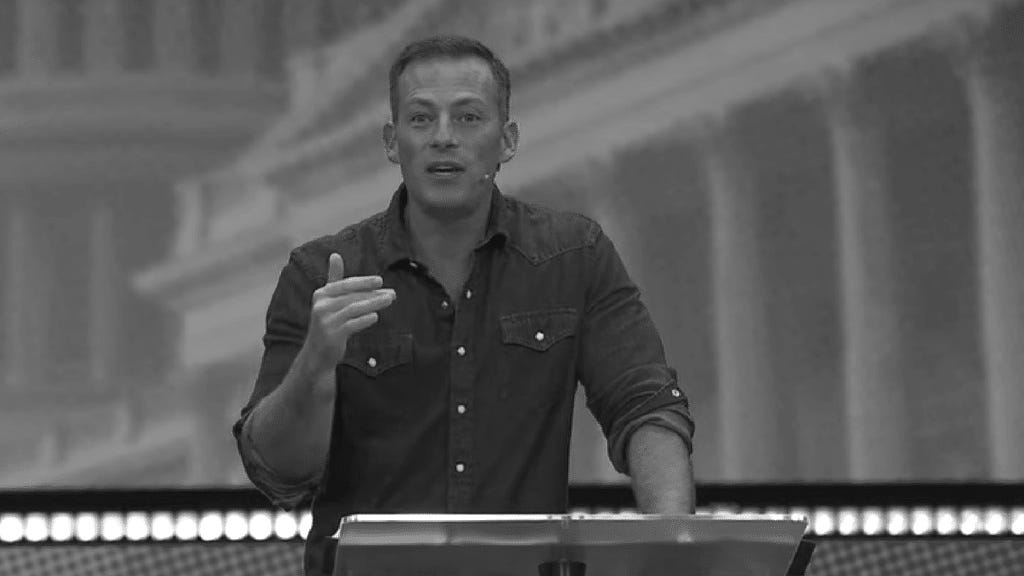God Doesn't Work Like That
Why Josh Howerton's Story Reveals the Wrong God
I keep seeing Josh Howerton's "king and the 40 lashes" story pop up everywhere. People are sharing it and talking about how beautiful it is. And I understand why…it's got all the ingredients of a powerful story. A king, his daughter caught stealing, the law demanding punishment, and then this dramatic twist where the king takes the beating himself. If you haven’t seen it you can watch it here:
The story hits you right in the chest. It's supposed to show how much God loves us, and honestly, the image of someone taking pain for another person is incredibly moving. But the more I watched it, the more something felt off. Not because I want to tear Josh down or start internet drama. It's because when I really think about what this story is saying about God, I don't see the same God that Jesus came to reveal.
If our stories end up making people love Jesus for saving them from the Father instead of revealing how much the Father loves them, we've actually missed the whole point.
The Problem With the Whip
Here's what keeps bugging me about this story: who's holding the whip? Who wrote the law saying that stealing gets you 40 lashes? Who decided that mercy could only happen after someone gets beaten bloody?
In the story, we're supposed to see the king as good and just. But when you look at what the Bible actually says about theft, the punishment isn't death or public beating…it's restoration. Exodus 22 lays it out pretty clearly: if you steal, you pay back what you took, sometimes four or five times over. The whole point was making things right, not destroying someone.
So if this king is supposed to represent God, we've got God creating a law that's harsher than anything He actually gave in Scripture. That creates a weird contradiction. The king looks merciful for taking the punishment, but he's the one who made the brutal law in the first place. It's like he's saving his daughter from himself.
What Jesus Actually Showed Us
When Jesus told stories about His Father, they looked nothing like this. Think about the father in the prodigal son parable…he's scanning the horizon, running toward his wayward kid, throwing a party before the son can even finish his apology. Or the shepherd leaving 99 sheep to find the one that's lost. Or the guy throwing a wedding banquet and inviting everyone off the street when the original guests don't show up.
In Jesus' stories, he's never the executioner who needs to hurt someone before He can show love. He's always the one running toward us, searching for us, welcoming us home.
The Bible Verses We've Heard
Now, if you grew up in church, you've probably heard the verses that seem to support the "God punished Jesus instead of us" idea. Isaiah 53:5 talks about how "the punishment that brought us peace was on him." And 2 Corinthians 5:21 says God "made him who had no sin to be sin for us."
These are beautiful passages, but they don't actually say the Father was up in heaven beating up Jesus out of anger. Look closer at Isaiah 53:4…it says "we considered him punished by God." That's describing how it looked to the people watching, not what was actually happening from God's perspective.
When you read the Gospels, it wasn't God whipping Jesus. It was Roman soldiers. It was religious leaders stirring up crowds. It was us…human beings…who killed him. And what did Jesus say while it was happening? "Father, forgive them."
What the Cross Really Reveals
The cross isn't about appeasing an angry God. It's about revealing a loving one. It shows us what God's love looks like when we throw our absolute worst at Him…it doesn't break. It doesn't retaliate. It absorbs the violence and responds with forgiveness.
When we see the cross as God punishing Jesus, we end up with this weird dynamic where we love Jesus for protecting us from the Father. But when we see it as God Himself entering into our mess to rescue and heal us, suddenly the whole Trinity is on the same team. Father, Son, and Spirit all working together for our good.
A Different Kind of Story
What if we told the king and daughter story differently? What if it went something like this:
The king finds out about the theft. He discovers it's his own daughter. Instead of dragging her to the town square, he asks her why she stole in the first place. Maybe she was hungry. Maybe she was desperate. Maybe the system was broken in ways that pushed her to this point.
So the king restores what was taken. He makes sure anyone who was wronged gets paid back. He invites his daughter to eat at the royal table. And then…here's the kicker…he changes the law so no one else will face that kind of punishment again.
That's not avoiding justice. That's justice that actually restores instead of just destroying. It's justice that looks an awful lot like mercy.
Why This Actually Matters
The stories we tell about God shape how people see Him. A kid who hears that God wanted to beat someone but beat Jesus instead is going to carry that image around. It's going to affect how they pray, how they see their own worth, and what they think God's heart is really like toward them.
But the actual good news is so much better than that. Paul puts it perfectly in 2 Corinthians 5:19: "God was in Christ, reconciling the world to himself, not counting people's sins against them."
The God that Jesus reveals doesn't sit on a throne writing cruel laws to protect His reputation. He doesn't demand that someone gets hurt before He can show love. He comes down into our mess, takes the worst we can dish out, and then says, "Father, forgive them."
If you watched that king and daughter video and felt inspired, I totally get it. The heart behind it is good. But if you also felt a little uneasy…like something wasn't quite right…trust that instinct. God's mercy doesn't work like that. And honestly? That's the best news you'll hear all day.
If this resonated with you, I'd love to hear your thoughts. Leave a comment and let me know what stories about God have shaped how you see Him. And if you found this helpful, consider sharing it with someone who might need to hear it too.





To quote Fr. Richard Rohr, Jesus did not come to change God's mind about us, but to change our minds about God.
You've done a wonderful job unmasking this story and pointing out how it does not speak of the God of Love. Good job!